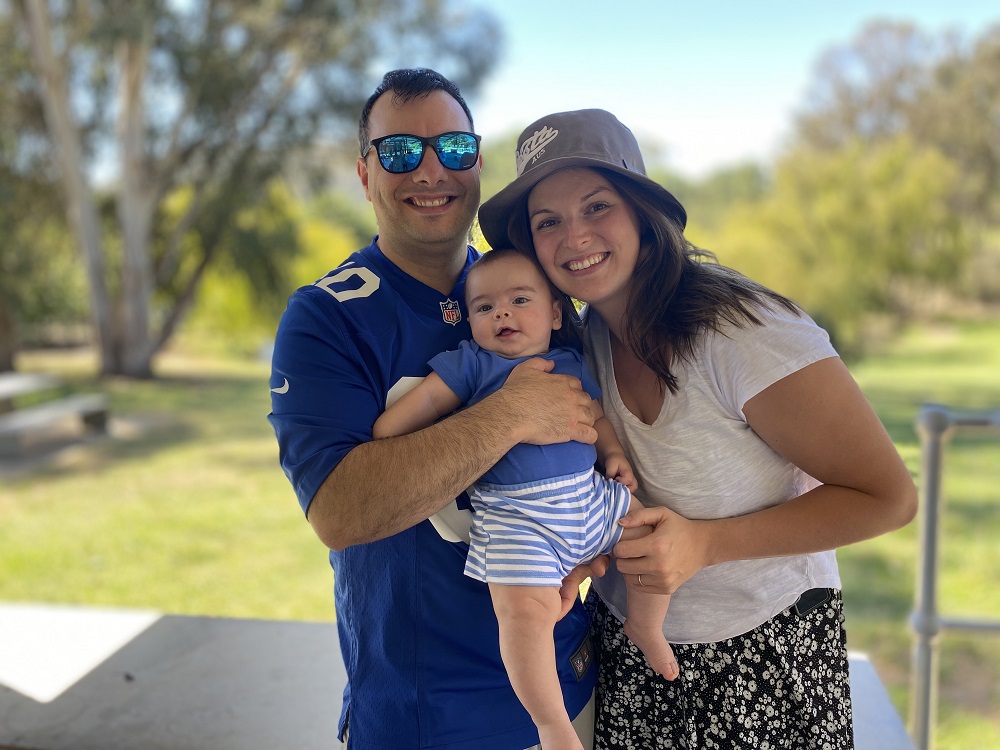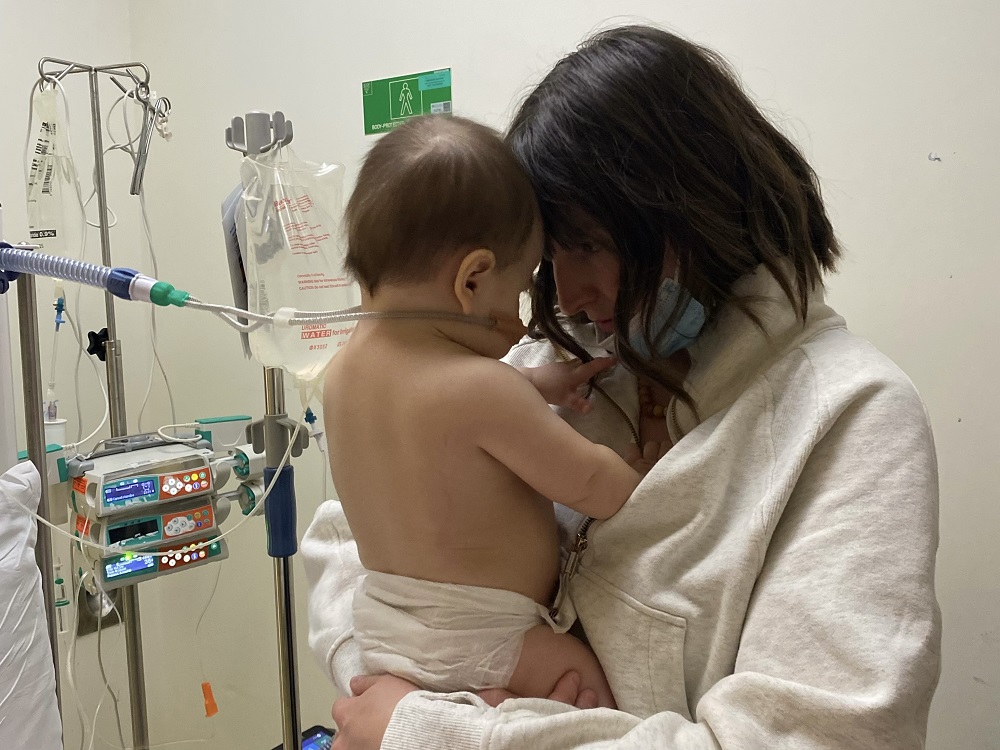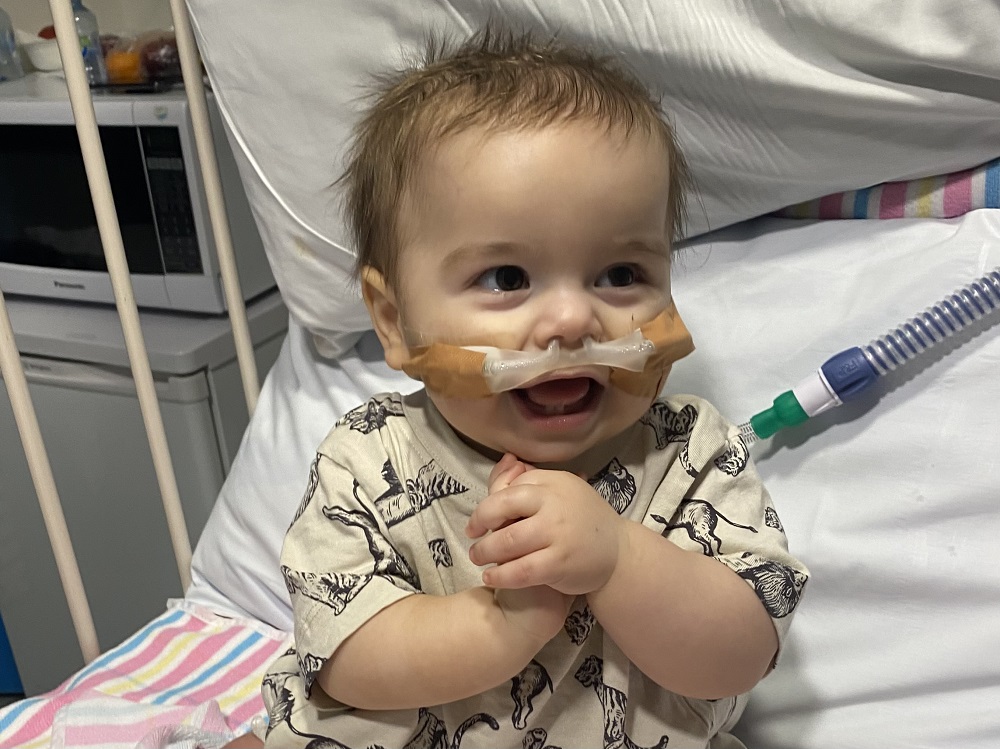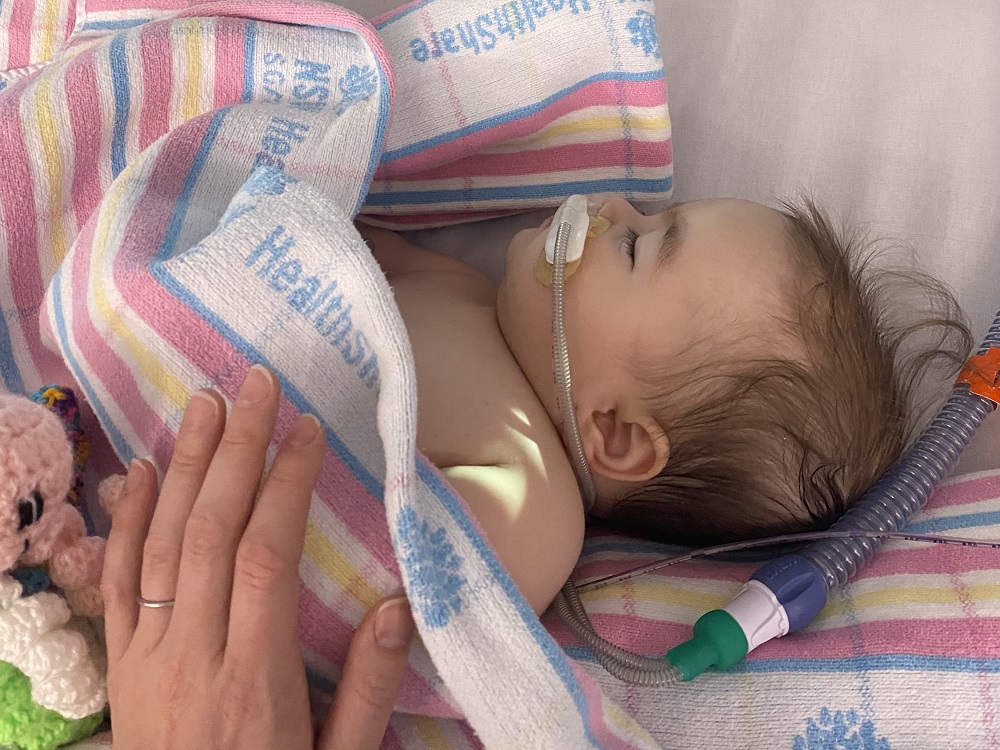Community Connections
"We couldn’t be more grateful to be where we are today"
Content warning: childhood cancer, serious illness, medical details, trauma.
For Keanna Costa, Web Service Manager with the University of Canberra’s Web Team, motherhood has been a rollercoaster of love, hope, fear, resilience … and a deep appreciation for scientific research. Her 18-month-old son Eli has overcome a rare childhood cancer because someone, somewhere conducted a study into neuroblastoma, which predominantly affects children under five.
Now, her family has made it their mission to raise both awareness and funds, to drive further research and hopefully spare other families the challenges they faced.
Keanna and her husband Fiore had always known they wanted to be parents, so when they got pregnant soon after buying a house in Canberra, it was a dream come true.
“We had all these dreams we’d been talking about for years – what we’d do when we had a kid,” she says. “Cheeky trips to the Lego store, visits to the zoo, we wanted to do them all!”

Baby Eli was born a little early, but was “perfectly healthy – it was all so beautiful, and we were so excited.”
The happy trio enjoyed just over six months of domestic bliss.
“We had such a blast – obviously there are things you struggle with as a new parent, but we had so much fun, and loved our little family adventures,” Keanna says. “We felt blessed, and I remember saying how lucky we were that our kid was healthy and well.
“I guess that was the real irony, because then Eli started to get sick.”
In June 2023, Eli became unwell, developing a prolonged wheeze and trouble breathing, initially diagnosed as croup and an ear infection.
“When that cleared up, he was ok for a week – but then got worse,” Keanna says. “He was diagnosed with bronchiolitis, and it didn’t clear up.”
Eli had been sick for about five weeks at this point, leaving Keanna incredibly worried and unsure of what to do next.
“I knew something was wrong – I woke up one morning, and found that he was really struggling to breathe,” she says. “I called an ambulance, and he was admitted to hospital. The next day he seemed much better, and we went home – but he still had a wheeze, and we were very anxious.”
Only a few days passed before they had to call the ambulance again.
“That night, I had slept for maybe an hour before Eli woke up crying and blue around the mouth,” Keanna says.
Keanna, Fiore and Eli found themselves in hospital once again – only this time, they were taken to the ‘resus’ or trauma area in the middle of the night.
“I remember thinking ‘If we're in here, something's really not right’ – I said that to a nurse, and she didn’t reply,” Keanna says.

Within minutes of a doctor coming to check on Eli, they could see that his chest was swollen on one side. An X-ray showed a collapsed lung.
“We spent 12 hours having tests done on Eli, and a CT scan revealed a massive tumour in his chest.”
Keanna and Eli were flown to Sydney Children’s Hospital.
“Only one of us was allowed in the helicopter with Eli, so Fiore had to stay in Canberra. During the flight, Eli was in so much pain that he was screaming,” Keanna says. “We didn’t know it at the time, but we were hours away from almost losing him.”
She spent the night trying to soothe him to sleep.
“He’d sleep for five to 10 minutes, and then wake up screaming in agony,” she says. “I had only slept for an hour in the last 48, and I got to a point where I couldn’t hold him because it was just too risky, because he was struggling and fighting me. I was terrified that in my state, I would drop him.”
Eli was then transferred to the ICU.
“He just collapsed and went blue around the mouth. His pulse dropped, and they did everything they could to stabilise him,” Keanna says.
All the fear that Keanna had ever felt in her life – cumulatively – still didn’t come close to this moment.
“None of it felt real, 15 people rushing into a room to resuscitate your child,” Keanna says. “My husband was already rushing to Sydney, and when he arrived an oncologist came to see us. He said all we know right now is that there is a tumour the size of a grapefruit in Eli’s chest, and it’s pushing his heart across his body and twisting his trachea – the trachea twist had caused the wheeze.”
The tumour’s size meant that Eli couldn’t be administered with a general anaesthetic, because if his muscles relaxed too much, the tumour would crush his heart – so surgery was not an option.
Doctors immediately began three different therapies – chemotherapy, steroids and antibiotics. They also put in a chest drain.
“A week later, they told us that Eli had neuroblastoma, it was stage four, and he had tumours from his neck down to his pelvis.”
Neuroblastoma is a cancer that starts in early nerve cells – neuroblasts – and causes them to grow uncontrollably.

“It turns out that Eli had been born with it,” Keanna says. “The main tumour in his chest had been growing, and he had been compensating to breathe – but then it had gotten too big, and he just couldn’t keep going anymore.”
In the first week post-diagnosis especially, Keanna and Fiore blamed themselves.
“For many parents, I think you just tend to take responsibility for whatever happens to your kid – as a new parent, I had tried so hard to do everything right,” Keanna says.
“Although we know this is just really bad luck and there is nothing we could have done about it, even today we still feel some guilt.”
The new parents had never even heard of neuroblastoma. “The doctors told us not to Google it – it’s an incredibly aggressive cancer,” Keanna says.
“The doctors tested the genetics of Eli’s cancer, so they could profile his risk – low, intermediate or high. Luckily, his risk was intermediate and the genetics of his specific neuroblastoma were favourable for treatment.”
Eli moved into the oncology ward at Sydney Children’s Hospital – and Keanna and her husband temporarily shifted their lives from Canberra to Sydney.
Eli’s adaptive chemo treatment was based on a study conducted in the United States.
“It’s based on the idea that you deliver the lowest amount of chemotherapy necessary for a particular risk profile, to target the neuroblastoma but also minimise harm,” Keanna says.
“Eli only needed four rounds of chemo, and has so far shown no signs of other damage to his other organs, loss of hearing, or other side effects that often occur from treatment of neuroblastoma. If this was 10 years ago, he would have had to undergo much higher doses. It was amazing in terms of both treating his cancer and also giving him the best health outcomes in the future.”

After two rounds of chemotherapy, Eli’s chest drain – which was helping him breathe – was removed.
“Towards the end of our hospital stay, you could tell how much it was wearing on him, so when we were able to leave the hospital, it made a huge difference to his mental health,” Keanna says.
After four rounds of chemo, Eli had CT and MIBG scans in September last year.
“They showed that the main tumour in his chest had shrunk by 95 per cent – and all the other previously present tumours were gone,” Keanna says. “He has five per cent of that large tumour left – and for an oncology parent, that’s wonderful news. His heart is back in the right place, his trachea is straight, and he can breathe with ease.
“Eli is still at risk of relapse as the remaining tumour wraps around his heart, but developmentally, he hasn't skipped a beat – he continues to amaze us!
“He has shown a real fighting spirit and has surprised every single medical professional along the way.
“We couldn’t be more grateful to be where we are today. We met so many other families in the ICU and the oncology ward, whose kids are still fighting – and sadly some whose kids never got to go home.
“We want to do everything we can to help. Because neuroblastoma is rare and about 50 kids are diagnosed with it in Australia every year, there’s just not enough research funding for it. Funding studies makes all the difference to better diagnosis – especially early screening – and treatment, and ultimately better outcomes in terms of survival rates and side effects.”
Now that Eli is over 12 months old, a relapse would automatically put him in the high-risk category, which will likely mean high doses of chemotherapy, a bone marrow transplant, radiation, and surgery – and which Keanna has been informed will see his survival rate drop to 50 per cent.
“We can't imagine going through all this again – but even worse,” she says. “Eli's future isn't guaranteed, and we are banking on the work of scientists to find less harsh treatments now. Without greater stable research funding in Australia, the options available to families here won't change.”

Eli and his family moved back to Canberra this year, and continue to monitor his cancer with regular medical reviews and tests.
Despite everything, if Keanna could pick one word to describe how she feels right now, it’s ‘lucky’.
“Isn’t it funny how your definition of ‘lucky’ can change?” she says.
“Because 10 years ago, the research that saved Eli didn’t exist, and we could have lost him. We take nothing for granted now. And we need to push this further, because we’re not the last family that will go through this – we need more, better research to save these kids.”
As part of their mission to raise funds and awareness, Eli’s Pit Crew will be running the 5.4km Fun Run and half marathon events at the Canberra Marathon this weekend. It’s a group of family, friends and well-wishers, and anyone can join them at this page.
“We also have a team fundraising page for Neuroblastoma Australia, which works to save kids’ lives through improving the efficacy and safety of treatments for neuroblastoma. We started with a humble goal of raising $500 when it was just my husband and I, but we've already bumped this up as more people are jumping in to support us,” says Keanna.
“This run team is very close to our hearts. We started running during Eli's chemotherapy treatment as a way to take care of our bodies and minds. I could barely run for more than 90 seconds before puffing out when we started, but some days going for a "run" was the only thing that kept my sanity together.
“Now that we're home, running is something we love doing as a family with Eli in the pram (he loves going ‘fast’!) and it gets us all outdoors and enjoying this beautiful city. It has had a profound impact on our wellbeing, so we're channelling that into something positive to come from Eli's cancer diagnosis: an opportunity to share Eli's story, raise awareness of paediatric cancer and advocate for research.”
Not really a runner, but want to help anyway? Join the Lifeblood team called Eli’s Pit Crew – they’re aiming to collectively save 72 lives via donations in 2024.
Words by Suzanne Lazaroo, photos: provided.